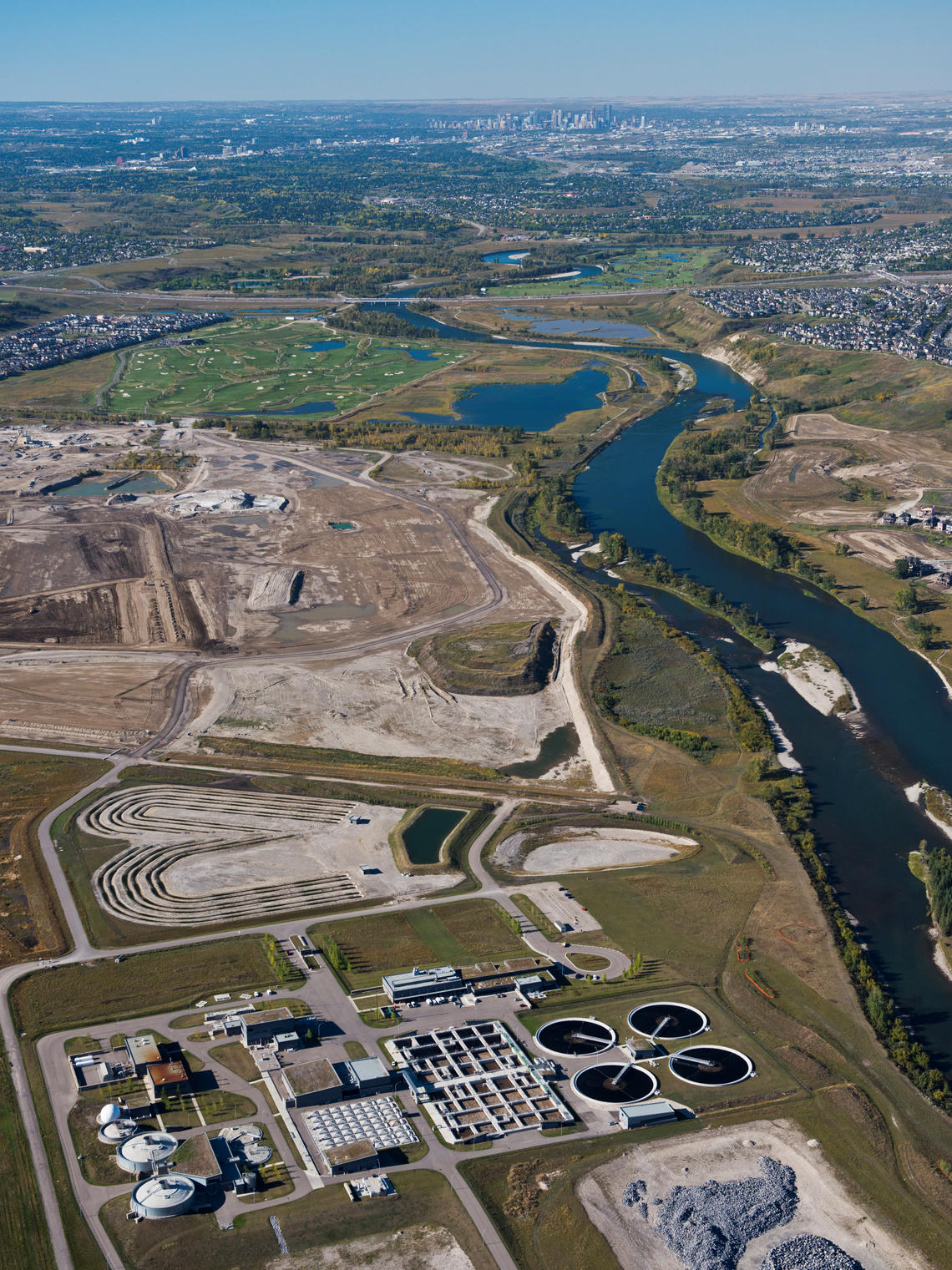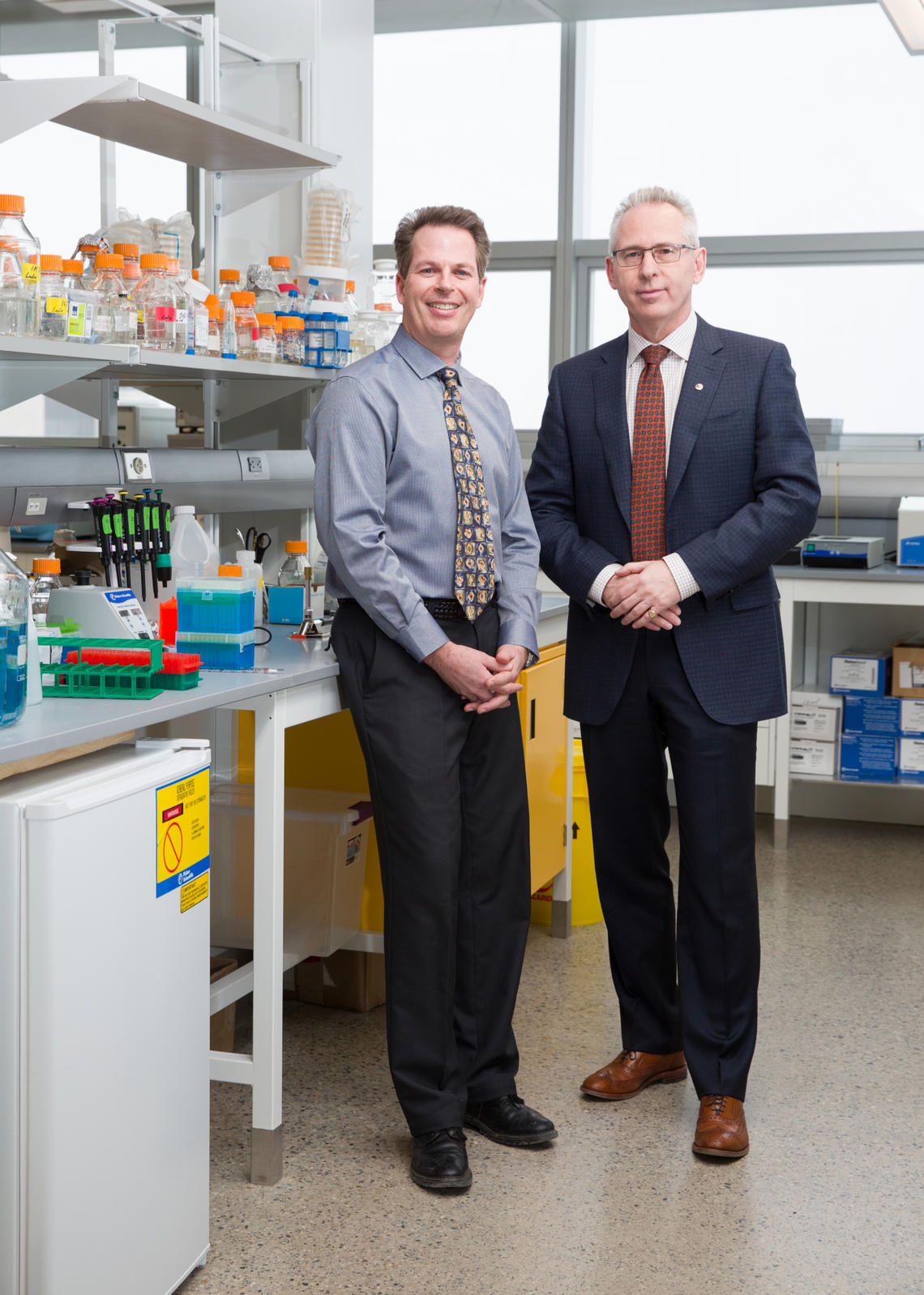
The Advancing Canadian Wastewater Assets research facility in southeast Calgary.
Keith Walker, Peak Experience Imagery
March 22, 2016

The Advancing Canadian Wastewater Assets research facility in southeast Calgary.
Keith Walker, Peak Experience Imagery
University of Calgary researchers have found a way to program algae with bacterial genes to target unwanted chemicals and pharmaceuticals that end up in wastewater.
Lee Jackson, scientific director of the Advancing Canadian Wastewater Assets (ACWA) research facility, and Joenel Alcantara with the Department of Microbiology, Immunology and Infectious Diseases at the Cumming School of Medicine, are planning to patent their new biotechnology shortly, once they conduct a few more tests.
“This has huge potential,” says Jackson. “Wastewater treatment plants have not been designed to remove chemicals and drugs that benefit our daily lives, yet find their way into our wastewater.”
Huge potential to help remove chemicals and drugs from wastewater
So far, the experiments have been conducted in the laboratory where Alcantara and Jackson have successfully implanted into algae bacterial genes that will break down antibiotics, pesticides and herbicides. They are currently testing versions that will target birth control drugs and commonly used antibiotics. These compounds can enter river systems through municipal wastewater effluents, stormwater, veterinary processes and agricultural run-off and have been detected in several river systems around the world, including the United States and Europe. There remain unanswered questions about their potential impacts on human and aquatic health.
Ultimately, Jackson would like to develop engineered algae that can be applied in a variety of settings. One type could target drugs and chemicals typically found in sewage ponds at feedlots and other agricultural operations. Another could be used as an additional means of treatment at wastewater treatment plants.

Lee Jackson and Ed McCauley.
Riley Brandt, University of Calgary
As a bonus, the researchers are using different algae to produce useful byproducts so that when they’re done breaking down contaminants, the byproducts can be used as biofuels, for example.
“It’s really important to us to find a value added purpose to this,” says Jackson. “We want to give this a lifecycle that’s safe for the environment.”
Once the researchers have completed more testing in the lab, Jackson says they’ll apply for a patent in the coming months.
Citizen Science projects to engage community
ACWA is also increasing its public education and awareness component around water issues through partnerships with Telus Spark, MindFuel, Trout Unlimited and IBM. Through Telus Spark and MindFuel (formerly the Science Alberta Foundation), ACWA is reaching out to both school children and adults with water literacy and awareness programming. A citizen science project is in the works for later this spring in partnership with Trout Unlimited to identify "Didymo," also known as rock snot, a type of algae found on river rocks. And through a web portal being designed in a collaboration with IBM, ACWA hopes to engage citizen observers, including science classes in rural locations, in crowd sourcing data on precipitation.
Located at The City of Calgary’s Pine Creek Wastewater Treatment Plant, ACWA is the only fully integrated, fully contained university research facility located within an operating industrial wastewater treatment plant in the world. ACWA brings together a multidisciplinary approach across several areas of expertise to address water issues.
ACWA is an initiative of the Urban Alliance, a strategic research partnership between The City of Calgary and University of Calgary, created in 2007 to encourage and co-ordinate the seamless transfer of cutting-edge research between the university and the City of Calgary for the benefit of all our communities. The senior administrations of both organizations are deeply committed to the success of the Alliance. The Urban Alliance is a prime example and vehicle for one of the three foundational commitments of the University of Calgary’s Eyes High vision to fully integrate the university with the community. The City sees the Alliance as playing a key role in realizing its long-term priorities and the imagine CALGARY vision.